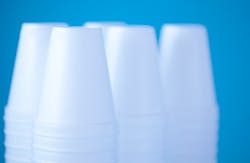A proposal to ban the use of polystyrene foam in New York City has met opposition not just from packaging manufacturers and food service businesses but also from a number of political figures.
The idea came from Mayor Michael Bloomberg, who suggested that polystyrene should be banned in a bid to reduce waste during his State of the City address in Brooklyn in February. However, his idea was rejected by numerous opponents, who claimed that imposing a ban on the material would lead to the loss of 1,200 local jobs because typically the material, commonly known as styrofoam, is manufactured in the vicinity of its commercial users.
Recently, New York State Senator Michael Nozzolio and Assembly Minority Leader Brian Kolb wrote a letter to Mayor Bloomberg and the city council, asking them to reconsider their proposal and to examine the broader impact it might have on the city.
According to a press release from Kolb's office, the ban would have a devastating effect on communities across the state, especially in Canandaigua, which both Kolb and Nozzolio represent. Pactiv, a polystyrene foam manufacturer located in Canandaigua, employs more than 1,000 local residents.
RELATED: Powder-handling solutions for the process industries
At a time when New York still has to deal with fiscal problems, introducing measures that would cost thousands of jobs and increase taxpayers' costs — while at the same time put more administrative pressure on communities — is unaffordable, the letter said. That is why Kolb encouraged the mayor and the city council to reconsider their idea and to look for alternative approaches to resolve the issue that would maintain financial stability and preserve jobs.
In turn, Nozzolio commented that imposing a ban on polystyrene would have "an immediate and dire effect" on in-state businesses that supply food service establishments and restaurants with polystyrene foam containers. He added that the city council should consider recycling options instead of banning its production and distribution.
Currently, 65 cities in the United States take part in polystyrene foam recycling programs, including large cities like Los Angeles. According to Kolb's office, replacing polystyrene foam with alternative materials such as paper would only increase waste and lead to higher costs because paper products used for food and beverages cannot be recycled.
The opinion shared by Kolb and Nozzolio has been supported by various industry representatives. Opponents of the ban include a number of business groups, such as the Business Council of New York State, the National Federation of Independent Business in New York and the Manufacturers' Association of Central New York. Mike Durant, director of the National Federation of Independent Business in New York, stated that the economy of the whole state was heavily influenced by that of New York City and the ban would have far-reaching implications on the industry outside the city. It would force small businesses to comply with additional mandates that could further hamper business growth, he added. Similarly, Randy Wolken of the Manufacturers' Association of Central New York noted that Mayor Bloomberg's concern for the environment in the city deserves to be praised but imposing a ban on polystyrene foam is not the best way forward.

